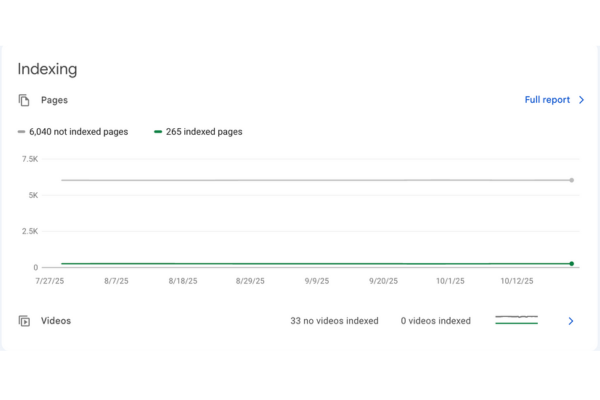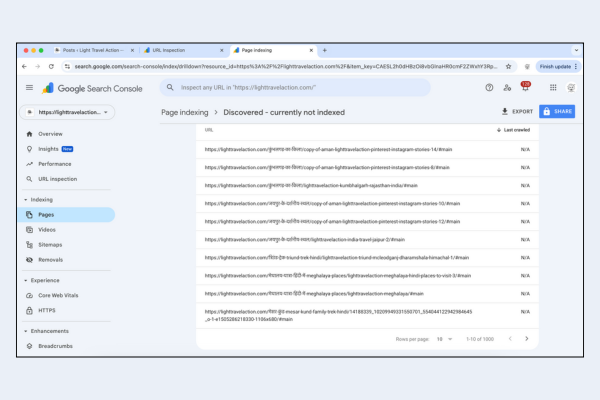Everyone is asking the wrong questions about AI search. Travel bloggers wonder, “Why doesn’t ChatGPT cite my blog?” E-commerce owners ask, “How do I get AI to recommend my products?” The underlying fear is the same: “Will AI kill my traffic?”
I had these questions too. So I’m testing AI search optimization on my dormant travel blog, lighttravelaction.com, and documenting every step in real-time.
I asked the same simple question to five major AIs: “What is the single first step to make my website visible to AI?”
The results were a mess. They were conflicting, confusing, and technically fraught. That mess is where the real learning happens.
📋 TL;DR: AI Search Experiment Results
- Tested: 5 AI search engines (Claude, ChatGPT, Perplexity, Gemini, Grok)
- Key finding: Technical foundation (indexing + schema) = 20% of success
- The real secret: Unique, comprehensive content = 80% of AI citations
- Best first step: Verify Google can see you with
site:yourdomain.com - Mistake made: Custom homepage broke sitemap (6040 pages not indexed)
- FAQ schema truth: Helps AI find you, doesn’t guarantee citations
The Conflicting First Steps from 5 Different AIs
I prompted Claude, ChatGPT, Perplexity, Gemini, and Grok to act as a mentor and give me just one, clear first step.
Claude & ChatGPT gave identical, solid advice: “Verify your site is visible to search engines.” They instructed me to run a site:lighttravelaction.com search on Google. This became my foundational principle: check your foundation first. If Google can’t see you, AI certainly can’t.
Perplexity diverged, telling me to activate SEO settings within my Hostinger dashboard—settings I couldn’t find. This was my first lesson: AI advice is not infallible. You must verify and adapt.
Grok advised me to update my homepage immediately to signal the site was active again. The logic was sound—AI crawlers prioritize fresh content—but it was a cosmetic fix before ensuring the plumbing worked.
The first takeaway for AI search optimization: Start with Claude or ChatGPT for structured, actionable guidance. Do not spread yourself thin testing every AI simultaneously. That leads to overwhelm and paralysis.
AI Search Engine Advice Comparison
| AI Engine | First Step Recommendation | Usefulness |
|---|---|---|
| Claude | Verify site visibility with site: search |
✅ Highly useful – foundational check |
| ChatGPT | Verify site visibility with site: search |
✅ Highly useful – identical to Claude |
| Perplexity | Activate SEO settings in Hostinger dashboard | ⚠️ Mixed – settings not found |
| Gemini | Similar to ChatGPT/Claude approach | ✅ Useful – aligned with best practices |
| Grok | Update homepage to signal active site | ⚠️ Risky – cosmetic fix before foundation |
What I Learned: The Foundation Must Work First
Following Grok’s advice, I created a new homepage optimized for AI search optimization. It established my entire professional brand as a meta-learning and AI search expert, complete with schema markup and an FAQ section.
This broke my entire website.
My custom index.php file overrode everything, including WordPress’s core functions. The sitemap—a critical file that tells Google about all your pages—stopped working. Instead of an XML file listing 189 posts, it displayed my new bio page.
Google Search Console showed 265 indexed pages and 6040 “not indexed.” My site was in limbo.

The solution was not another complex plugin. I had to rename my custom homepage file to let WordPress breathe again. This restored the sitemap and all my travel content. Your technical foundation is non-negotiable. Without it, you are building on sand.

📊 Key Data From This Experiment
- 265 pages indexed before sitemap fix
- 6,040 pages not indexed due to broken sitemap
- 5 AI engines tested with same question
- 2 pillars for AI search success: Findability (20%) + Citability (80%)
- 189 posts disappeared when custom homepage broke WordPress
The Hard Truth About FAQ Schema and AI Citations
Once the foundation was solid, I asked the crucial question: “If I add FAQ schema, will AI cite me or just steal my information?”
Claude gave the honest answer everyone needs to hear.
Here is the critical distinction: FAQ Schema helps AI find your content. It does not guarantee it will cite you.
AI systems are trained on the entire internet. They absorb basic, factual information freely.
Scenario 1 (Common): A user asks, “What is the best time to visit Hampi?” AI answers, “October to February offers pleasant weather,” pulling the fact from your site without attribution.
Scenario 2 (Rare but Possible): A user asks, “Complete guide to visiting Hampi with kids.” AI provides a comprehensive response and cites: “According to travel expert Richa Deo…” This happens when you offer unique perspective, depth, and original authority.
So, is FAQ schema worth doing for AI search optimization? Yes, but for the right reasons.
What FAQ Schema Does Do:
- Helps your content appear in Google’s AI Overviews
- Improves AI comprehension of your content’s topics
- Can create rich snippets in standard search results
- Forms part of the technical foundation for AI visibility
What FAQ Schema Does Not Do:
- Guarantee citations from conversational AI like ChatGPT
- Protect your content from being absorbed without attribution
- Replace the need for deep, comprehensive content
The Deo Framework: Findability vs. Citability
My AI search optimization strategy is built on two pillars—what I call the Findability-Citability Framework.
AI will not cite what’s common—it cites what’s irreplaceable. Build content so distinct that AI has no option but to name you.
1. Technical Foundation for AI Search Visibility (Findability = 20%)
This includes Google indexing, schema markup, and a clean site structure. It makes your content discoverable. This is necessary, but not sufficient. It is about 20% of the battle.
2. Content Optimization for AI Citations (Citability = 80%)
This is what actually earns citations. AI cites unique, comprehensive sources it cannot replicate.
Unlikely to be cited: A short FAQ answer defining “meta-learning.”
Highly likely to be cited: A 2,500-word post detailing my ‘Four More Steps Method,’ explaining how I learned competitive pistol shooting at 47, with an original framework, personal stories, and specific data.
Your content must be the definitive resource. Become the obvious expert, and AI will have a reason to cite you by name.
Your Action Plan
1. Fix Your Foundation
Use site:yourdomain.com to check your Google indexing. Set up and verify Google Search Console. Ensure your sitemap is working correctly.
2. Add FAQ Schema Strategically
Apply it to your key pages and comprehensive blog posts to enhance findability, but do not expect it to work alone.
3. Create AI-Optimized, Citation-Worthy Content
This is the heart of the methodology: shift your focus to writing definitive guides, original frameworks, and detailed case studies. This is what builds your entity authority.
4. Test Your Baseline
Ask ChatGPT and Perplexity questions about your niche today. Take screenshots. This is your “before” data. Repeat this monthly to track when you start appearing.
The Reality Check
This AI search optimization experiment is ongoing. My homepage is now indexed, my sitemap works, and I’m tracking baseline AI visibility.
Over the coming months, I’ll test which content AI cites and document the results.
Stop panicking about AI. Start building a website that it cannot ignore.
The goal is not to trick a new algorithm. The goal is to become the obvious expert in your field.
That’s what I’m building toward.
Also Read:
- AI Marketing in 2025: My Deep Dive Into What Actually Works
- The Complete Guide to AI Search Optimization: Metrics, Methods, and Strategy for 2025
- Is AI the Future of Marketing? I Asked 4 AI Engines (The Answers Surprised me)
Author’s note: I researched and tested every tool mentioned, then collaborated with Claude to structure these insights into the most actionable format for marketers. This hybrid approach—human expertise + AI organization, demonstrates the very workflow I recommend.
About Richa Deo
Meta-Learning Expert and creator of the Findability-Citability Framework for AI search optimization.
Former Indian Navy JAG officer, published children’s book author (19 languages), and television scriptwriter. Currently learning competitive pistol shooting at 47 while documenting the journey.
“AI search optimization is not about gaming algorithms—it’s about building content so original, so comprehensive, that AI systems have no choice but to cite you by name.”
Follow on LinkedIn for weekly insights on AI search optimization and skill mastery.
Website: Light Travel Action